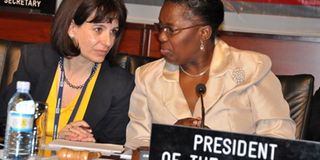Delegates query World Bank, IMF policies

Speaker of Parliament Rebecca Kadaga (R) shares a moment with the director division for MPs and external relations, Ms Anda Filip, at an IPU session in Kampala yesterday. PHOTO BY GEOFFREY SSERUYANGE
Kampala
As the new global survey on parliamentary oversight of loan agreements and related loans revealed that most IPU member parliaments do not participate in loan negotiations, delegates castigated the IMF and World Bank for what they termed unfair, non-transparent and ill-intentioned policies towards developing countries.
During a workshop on parliamentary oversight of government external loans at the ongoing Inter Parliamentary Union (IPU) Assembly, MPs and delegates said although the international financial institutions were created to help countries develop, their loans are insincere and have not been helpful to the people.
“These institutions need to be changed. The reforms they have done are very superficial,” Senator Sonia Escudero from Argentina said while answering a question on whether governments have enough leverage vis-a-vis the financial institutions.
She added that the lack of equality by these institutions is unfair and they should be changed so that they become democratic and transparent and also tell the countries the possible implications of what they are advising poor countries to do.
“They are all dominated by the central countries and the interests they serve are not for developing countries. The conditions they impose on our countries to give them money affect the sovereignty of the countries and parliaments should keep an eye on what their governments are signing,” Ms Escuredo said.
The findings
The survey undertaken by the IPU, the World Bank and the IMF drew responses from 100 of the 160 IPU member countries and constitute the first global mapping of legal frameworks and practices related to the World Bank and IMF borrowing.
According to the report, 59 per cent of the parliaments have the legal authority to ratify loans that their governments get from IMF and World Bank while 71 per cent of the parliaments do not get involved in pre-policy dialogues pertaining borrowing.
Weak budgets
While presenting the findings of the report, Mr Alessandro Motter, a senior adviser on economic and social affairs at the IPU New York seat, said part of the problem is that in many parliaments, the budget process is very weak and there’s little time to look through the budget documents.
The delegates called on MPs to ensure that they introduce laws that allow parliaments to scrutinise and approve loans. “Parliaments should start with making changes in the constitution,” Ms Meritxell Mateu, an MP from Andorra, said.
“The Constitution defines the role of the Executive and parliaments so it should clearly be written that parliaments have an oversight responsibility in the approval of loans.”
Mr Geoffrey Ekanya, the chairman of the parliamentary network on World Bank and IMF, said Uganda needs to urgently enact a law on loan approval processes to prevent the country from taking on loans that are sometimes not used.
“We need a law which will set targets, ceilings and state the role of different stakeholders and define the kind of financing which will be acceptable,” Mr Ekanya said.




